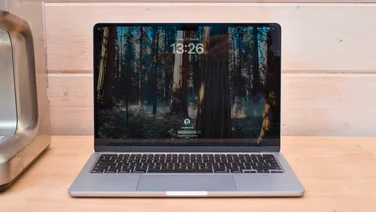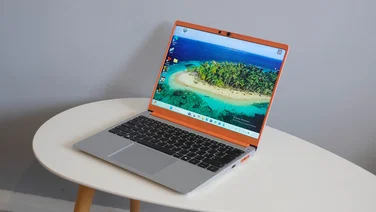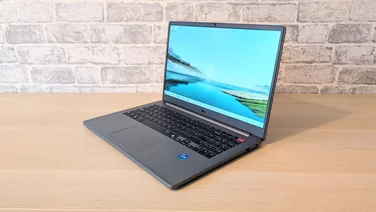To help us provide you with free impartial advice, we may earn a commission if you buy through links on our site. Learn more






















- Terrifically affordable
- Solid, versatile kickstand
- Bright 12.3in touchscreen
- Resolution is merely adequate
- Palm rejection could be better
- Plastic buttons feel a bit cheap
Microsoft’s various Surface machines are undeniably desirable. Their only sticking point, really, is the price. Happily, there are now cheaper alternatives for the more penurious among us, thanks to Chinese OEMs who take the idea that “imitation is the sincerest form of flattery” to its logical conclusion.
One such manufacturer is Chuwi, which earlier this year released its first Surface-like machine, the well-received UBook, which featured an 11.6in display, 128GB of SSD storage and a 6th-generation Intel Core m3 processor for around £300.
And now it’s revealed the more powerful UBook Pro, which improves on the UBook in almost every way for not much more money. The question is, of course, whether it’s a viable alternative to the Surface Pro.
Chuwi UBook Pro review: What you need to know
The UBook Pro is a 2-in-1 laptop that pays obvious homage to Microsoft’s Surface machines. While not as powerful as the Surface Pro 7, it’s a more substantial machine than the Surface Go, featuring a 12.3in Full HD touchscreen, an Intel Core m3-8100Y processor, 8GB of RAM and a 256GB SSD. There are several buying options available but we strongly recommend you go for the model which has a bundled keyboard cover and stylus in order to make full use of its hybrid capabilities.
Chuwi UBook Pro review: Price and competition
Right now, the Chuwi Ubook Pro with keyboard and stylus pen can be purchased from AliExpress for only £322.34. This amount is listed as an 18% reduction from the full £393.10 price but, since it’s only just gone on sale in the past week, that’s a somewhat dubious claim. If you just want the standalone UBook Pro device then it’s only £276.29. It’s definitely worth paying the extra for those accessories, though.
For a similar price to the UBook Pro, you could get a Microsoft Surface Go instead, but the £380 model comes with just 64GB of storage and 4GB of RAM, not to mention a smaller 10in screen and a less powerful Intel Pentium Gold 4415Y processor. On top of that, you’ll need to budget an extra £100 for the keyboard cover.
If you’re set on buying the latest Surface model with the same screen size as the UBook Pro, you’ll be looking at the Surface Pro 7. For that, you’ll have to cough up £800 for the version with 128GB of storage, or £1,169 for the 256GB model. And again, that’s without a keyboard.
Looking for something even cheaper than the UBook Pro? The diminutive Linx 12X64 now sells on Amazon for under £200 – although its Atom x5-Z8350 CPU is only suitable for the most lightweight tasks.
Chuwi UBook Pro review: Design
Before discussing the physical build of the Chuwi, I must make clear that the unit I tested was a prototype model, produced during Chuwi’s Indiegogo funding campaign for the UBook Pro. Chuwi states that the final hardware will feature a longer-lasting battery, a newer keyboard and an improved stylus that supports 4,096 levels of pressure, rather than the 2,048 of Chuwi’s current HiPen H5.






















With that caveat out of the way, I can’t seriously fault of the build quality of the pre-release hardware. The metal back and glass front are held together by a rigid plastic frame, making it feel more robust than you might expect. That plastic chassis also helps keep the weight down: at 770g the UBook Pro is surprisingly light.
Meanwhile, the metallic rear has a grippy finish to it, which makes it pleasant to hold even for prolonged periods. The integrated kickstand is well-engineered too, remaining firmly fixed at whatever angle you set it to within its 95-145 degree range. Its unusual shape allows it to be hooked for impromptu wall mounting, and when folded away, the kickstand is wholly unobtrusive.






















The UBook Pro’s height and width of 292 x 208mm are very similar to those of the Surface Pro 7. With a depth of 9.9mm it is a little thicker, but the sides house a better array of connectors: there are two USB 3 Type-A ports, one on each side, plus one USB Type-C port, a 3.5mm audio jack, a mini-HDMI connector and a DC power jack. On top, there’s a fully-recessed microSD card slot.






















Although the connectivity options are good, I don’t like the way the power and audio jacks are situated toward the top of the tablet – it leaves cables dangling messily. I understand that it wasn’t possible to place them at the bottom (because the stand would get in the way), but even a little lower would have been better. It’s also a shame that the plastic power and volume buttons feel conspicuously low-rent compared with the device’s overall build.






















The UBook Pro also has a 2MP webcam at the front and a 5MP one at the back, but these are low-quality sensors that are inferior to those found on any mid-range smartphone. The stereo speakers sound a bit brittle and lacking in bass, but there’s volume aplenty.
Chuwi UBook Pro review: Keyboard and touchpad
The Ubook Po’s final connector is for the keyboard, which attaches securely with a magnetic fold that gives it a 10-degree slope, just like the Surface Type Cover. The key action is shallow but definite, while the touchpad worked reliably. My one criticism here would be that the cover felt too flexible, but Chuwi promises that the final product will be more solid and (in the manufacturer’s own words) “Surface-like”, with a glass-covered trackpad and keyboard backlight.






















There’s also a battery-powered stylus in the box, and I found it perfectly fine for basic text input and graphics work. It’s not a real rival to the Surface Pen, though, not least because there’s no tilt detection. The UBook Pro’s palm rejection stands to be improved too: I found I had to be rather deliberate when writing and drawing to avoid accidentally brushing against the touchscreen.






















Still, let’s not forget that both the Surface Type Cover and Surface Pen are expensive optional extras, while Chuwi’s equivalents are included in the (much lower) purchase price.
Chuwi UBook Pro review: Display
The UBook Pro has a 12.5in IPS screen with a resolution of 1,920 x 1,280. That represents an aspect ratio of 3:2 (which I think is the ideal shape for a device like this), but an unexceptional pixel density of 188ppi. That’s fine, but it can’t match the Surface Pro 7, whose 2,736 x 1,824 panel delivers an impeccably sharp and smooth 267ppi.






















On the bright side, its maximum luminance of 390cd/m2 is impressive, as is the sRGB coverage of 97% and its contrast ratio of 1,049:1. Viewing angles are robust, which is great for a tablet-style device where you might not always be sitting directly in front of the keyboard. The ten-point touchscreen works perfectly too, responding flawlessly to multi-finger gestures in Windows.
Chuwi UBook Pro review: Performance and battery life
The UBook Pro is built around an Intel Core m3-8100Y processor, currently the newest Core m chip on the market. This means there are no issues with the latest UHD video codecs or high frame rate output. And while it’s towards the lightweight end of Intel’s processor line-up, it’s powerful enough to deliver a perfectly fluid user experience that’s far slicker than you’ll get from a Celeron-based or Atom-based machine.
Techie types might note that Chuwi has partnered the CPU with cheaper single- rather than dual-channel memory, but this doesn’t have much visible impact on performance. In our in-house benchmarks, the UBook Pro achieved an overall score of 24, which is exactly what you’d expect from a computer with this processor. The UBook Pro got rather warm when under heavy load, especially on the right-hand side in the area around the power socket, but it’s not what I’d describe as worryingly hot.






















The 256GB SATA3 SSD comes from a company called Netac, and this too turned in read and write speeds that were absolutely average for this type of system. I couldn’t get the UBook Pro apart to check if the SSD or RAM can be upgraded – so I’m guessing not.
Another thing that’s common to Core m systems is that the integrated Intel HD 615 GPU puts a real restriction on gaming. It can run less demanding 3D games like Counter-Strike at around 30fps, but you’ll have to turn the resolution down to 1,280 x 720, and set all the detail options to ‘Low’. When I tried turning up the detail levels and resolution, I was left chugging along at an unplayable 13fps.
Wireless communication is handled by Intel’s popular dual-band AC3165 card, and I had no problems with Wi-Fi reception or performance. The use of a plastic frame doubtless helps the Wi-Fi antennas breathe, and the Bluetooth 4.2 radio performed faultlessly too.
Although Windows 10 ran smoothly on the UBook Pro, I had no luck trying to install Linux on it: try as I might, I couldn’t get either Ubuntu or Clear Linux to boot. Still, that’s not really what this system is intended for, as Linux isn’t optimised for touchscreen devices.






















The UBook Pro comes with a 37Whr, 5,000mAh battery, and this lasted 6 hours and 20 minutes in our regular video-playback test. Chuwi says the production version will do better, but to be honest I’m already happy: in casual, everyday usage I found I was able to get more than 7.5 hours from a charge.
Chuwi UBook Pro review: Verdict
There’s little to dislike about the UBook Pro. For the money, it’s a highly competent system with a fine screen, a respectable processor, a decent amount of storage and a good set of ports. It will deliver what most people demand from a 2-in-1, and the fact that the keyboard and stylus are bundled into the price only sweetens the proposition.






















To reiterate, the system I’ve tested isn’t the final version, but based on what I’ve seen it makes a great low-cost alternative to a pricey Surface Pro 7. And if Chuwi makes good on its promises, the production hardware that buyers receive will be even better.








